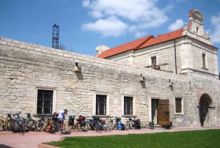TERNOPIL — Selling such castles and fortresses will save them from complete ruin. This was the key idea of a regional conference on the protection of cultural heritage, preserving the traditional environment of historic populated areas. It was entitled “Preservation and Adjustment of Castles in Ternopil Oblast” and held in Zbarazh. Among those present was Volodymyr Yatsuba, Minister of Regional Development and Construction of Ukraine, and representatives of the industry in Lviv, Zakarpattia, Volyn, Rivne, and Ivano-Frankivsk oblasts.
Although one finds numerous castles and fortifications, most are in a lamentable condition, with foundation being the only thing left of some. The central budget cannot afford to restore historical monuments in Ternopil and other oblasts, considering that this year’s appropriations amount to a mere 35 million hryvnias. “That’s less than peanuts,” Yatsuba told journalists and assured them that the government is working on a budget program for the next year. He did not specify how it would work, but kept stressing the need to simplify the privatization and concession procedures: “My task is to rid people of the humiliating authorization procedures and provide conditions for doing business.”
It would be great, of course, to find investors capable of restoring castles and fortresses that would accommodate museums, art galleries, historical reconstructions, for all this would attract tourists. Anatolii Matsura, director general, Ternopillia Castles National Preserve, kindly described the tourist-attraction prospects of every castle (incidentally, there is already someone willing to buy a castle in Buchach raion. His name is Petro Hudz, he is the CEO of the powerful association Buchachkhlibprom. He came to attend the conference from Zbarazh and discuss the issue with Minister Yatsuba.)
However, there are cases in Ukraine when investors fail to honor their commitments — for example the scandalous case of the Lanckoronski Palace in Stary Rozdil, Lviv oblast, when the investor, who had bought the palace for token money, actually kept destroying rather than restoring it, removing from the walls 13 bas-reliefs worth at least three million dollars.
Ternopillia Castles Preserve includes 18 castles and is centered in Zbarazh Castle where the regional conference took place. This is probably the only historic site in the locality and one of few in Ukraine to have been restored with state money, which is graphic proof that the state can be an effective owner of its own historical monuments. This museum complex keeps evolving, attracting domestic and foreign tourists who want to feel the atmosphere of antiquity. The big question is: Will privatized castles and fortresses remain open for visitors? Or maybe there will be private-property-no-trespassing warnings, as was the case in Stary Rozdil? These days one is hard put to see official acts [titles] allowing the owners to sell historical monuments as fair. Most likely, if and when made legally valid, they will become another way to legalize hostile takeovers.
COMMENTARIES
Oksana KOZYNKEVYCH, chairperson, supervisory board, Pidhirtsi Castle:
“Concession is a good thing, generally speaking. Granting concessions has been practiced for decades in France, Germany, and Switzerland. No problem there because decent patriotically minded people are involved. Ukraine is a different story, so much so we must not allow this to happen. First, if granted a concession, they will bar access to the general public, they probably won’t even allow people to walk round the castles. We all remember what happened after the castle of Karol Lanckoronski had been privatized in Stary Rozdil, in return for 460,000 hryvnias (and this considering that the castle was on sale together with a 12-hectare park). Once a luxurious palace, it now offers a strikingly miserable sight, with bare peeling walls and heaps of garbage. There used to be a breathtakingly beautiful park with rare tree varieties brought from all over Europe. Now it is a wasteland overgrown with weeds, with stumps in place of trees. The new owner started by tearing down Renaissance bas-reliefs off the walls (no one knows what has become of them). The director of our art gallery managed to save only four sculptures.”
Borys VOZNYTSKY, director, Lviv Art Gallery:
“What do you mean concession? The castles are subject to no concession, the more so that our president gave us a list of castles exempt from privatization, concession, and so on. None of our castles can be privatized except the Pomoriany one (they forget to enter it in the list). There are only 25 castles in Ukraine. That’s a handful, compared to 180 in Poland and 360 in the Czech Republic. Isn’t there anything we can do to develop tourism and encourage people to come visit these places, especially if this is what we want? There are no concessions in Europe. They have property instead. Castles are bought or rented. And here? Ukraine can’t sustain 25 castles, to keep them open for the public instead of letting private individuals keep them locked and bolted? We can’t allow this to happen! Yes, I understand: our businessmen have everything except [genuine ancient] castles.”
Iryna MAHDYSH, editor, cultural journal Yi:
“Theoretically, granting castles and fortresses as private concessions sounds good. That was how they saved quite a few pieces of the cultural heritage in Poland. I mean it’s probably the only way to preserve these monuments, revitalize them, making them functional instead of leaving them in ruins, but only when the law is actually observed, with corruption being reduced to a minimum. Considering the situation in Ukraine, there is a very big risk of this theoretically good project turning into its exact opposite. Knowing our rampant corruption, disregard for the law, absence of public oversight, the greed and improbity of those who can afford to invest in such concessions and privatization, we would run a very high risk by allowing our castles to become private property and putting in black and white that they will be used only as cultural monuments. I’m convinced that in a couple of years they would all become banal privately owned hotels, maybe private mansions closed to the public.







